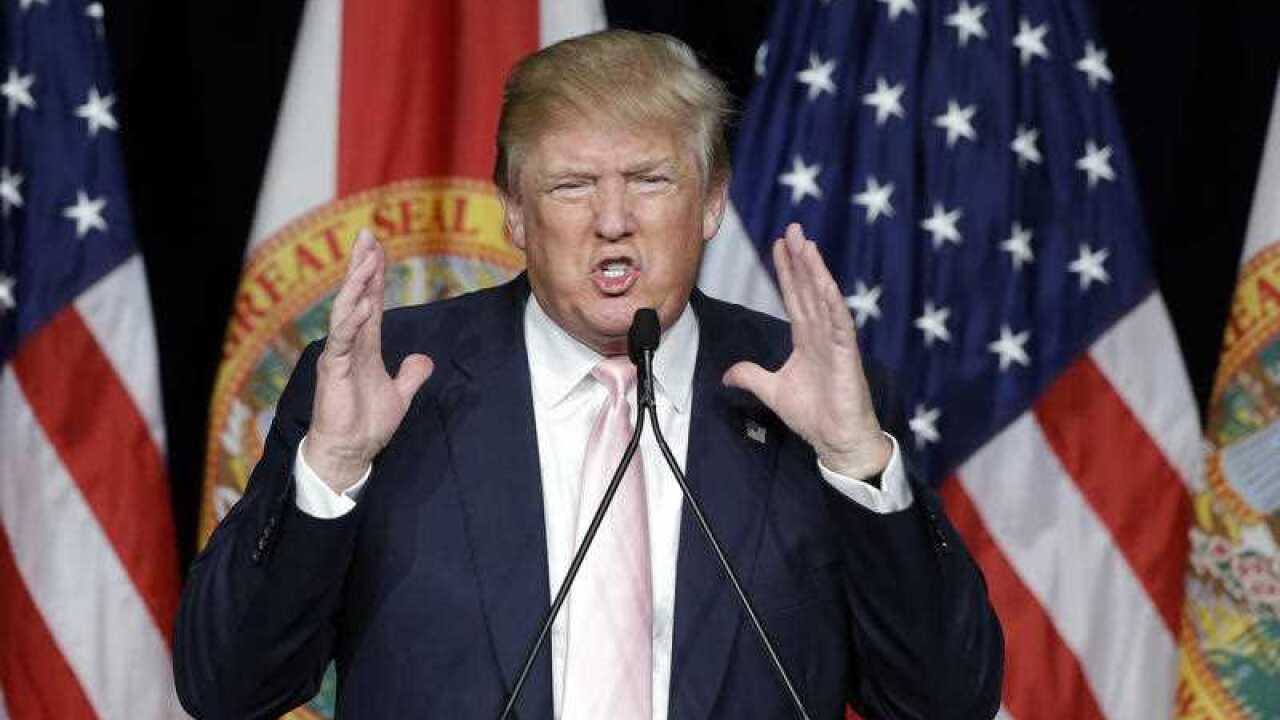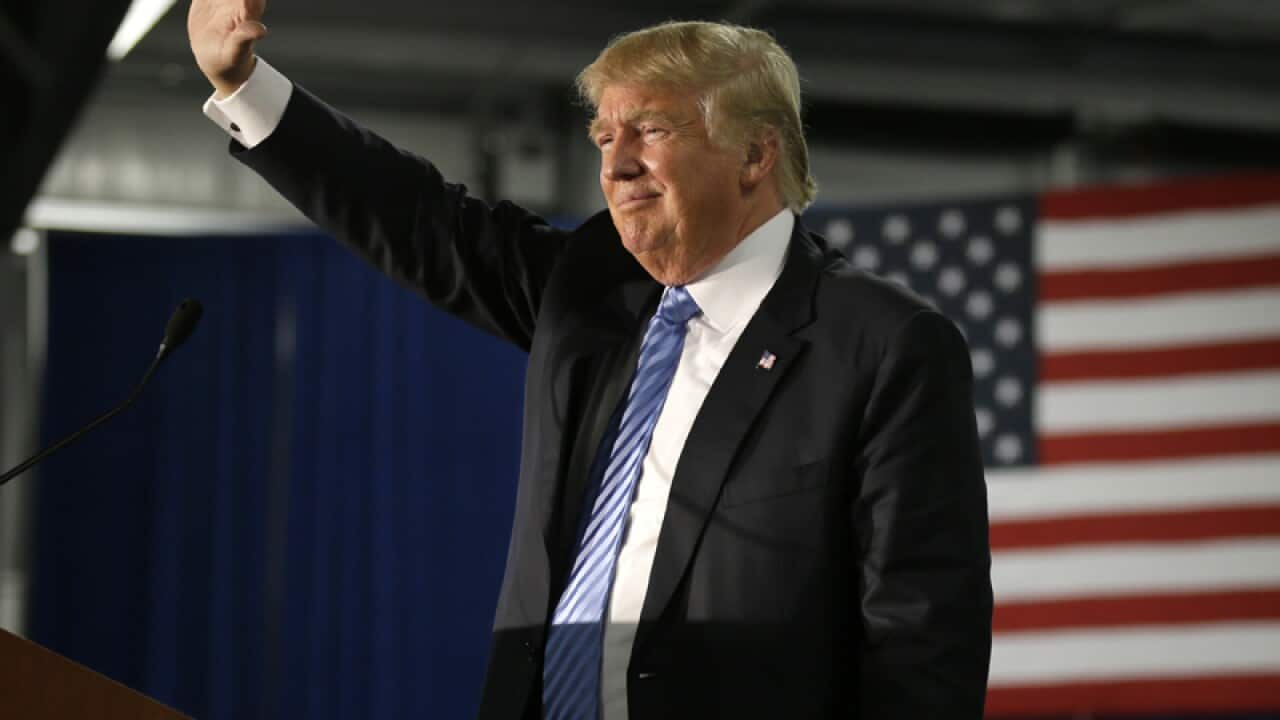The Pentagon is warning against fuelling Islamic State's narrative of a US war with Islam, in a swipe at rhetoric by Republican presidential candidate Donald Trump that has triggered outrage around the world.
Mr Trump on Tuesday defended his proposal to ban Muslims from entering the United States, comparing his plan to the World War Two detainment of Japanese-Americans and others in dismissing growing outrage from around the world.
Asked about Trump's remarks, Pentagon spokesman Peter Cook said Muslims serve in the US armed forces and that America's war strategy to combat Islamic State hinged on support from Muslim countries.
"Anything that bolsters ISIL's narrative and pits the United States against the Muslim faith is certainly not only contrary to our values but contrary to our national security," Cook told a news briefing, using an acronym for Islamic State.
Cook did not mention Trump by name and said he did not want to wade into domestic political matters. The Pentagon is helping local forces battle Islamic State and other extremists in Iraq, Syria, Afghanistan and elsewhere.
US Homeland Security Secretary Jeh Johnson said Trump's proposal could thwart US efforts to connect with the Muslim community, and Secretary of State John Kerry said his ideas were not constructive.
The Pentagon counts thousands of service members who self-identify as Muslims.
US leaders from both political parties, the prime ministers of France and the United Kingdom, the United Nations, and Muslim residents of Asian countries all denounced the comments by Trump, the Republican front-runner for the November 2016 presidential election.
But the real-estate mogul said his ideas were no worse than those of former President Franklin D. Roosevelt, who oversaw the detention of more than 110,000 people in US government camps after Japanese forces bombed Pearl Harbor on Dec. 7, 1941.
"What I'm doing is no different than FDR," Trump said on ABC's "Good Morning America" program.
"We have no choice but to do this," he said. "We have people that want to blow up our buildings, our cities. We have to figure out what's going on."
Trump called for blocking Muslims, including would-be immigrants, students, tourists and other visitors, from entering the country following last week's California shooting spree by two Muslims who authorities said were radicalized.
It was the most dramatic response by a presidential candidate following the San Bernardino, California, rampage, even as other Republicans have called for a suspension of President Barack Obama's plan to allow in some refugees from Syria.
"Donald Trump is Hillary Clinton's Christmas gift wrapped up under a tree"
Backlash quickly came from all corners. In the social media reaction, hashtags such as #racism, #fascism and #bigot trended heavily after Trump's proposal on Monday.
The Philadelphia Daily News put a photo of Trump with his right arm extended on its cover with the headline "The New Furor," a play on Adolf Hitler's title - fuhrer - in Nazi Germany.
Critics said Trump's plan would likely be unconstitutional for singling out people based on their religion. But Trump spokeswoman Katrina Pierson told MSNBC the US Constitution does not apply to non-citizens.
Republicans warned that if Trump is the party's nominee, his stance could hurt in a general election against Democratic front-runner Hillary Clinton.
"Donald Trump is Hillary Clinton's Christmas gift wrapped up under a tree," Republican presidential candidate Carly Fiorina said on Twitter.
US House of Representatives Speaker Paul Ryan, a Republican, told reporters the plan was "not conservatism." But he said he would support the party's presidential nominee.
Democrats, meanwhile, blamed Republicans for Trump's extreme language and warned it could help him with primary voters.
"Donald Trump is standing on the platform of hate, and, I'm sorry to say, hate that the Republican Party has built for him," said Senate Minority Leader Harry Reid, a Democrat.
Huma Abedin, a top aide to Clinton, sent a fundraising email Monday night declaring her own Muslim faith. "Unfortunately, Trump is leaning into the kind of fear of progress that very well could help him win the nomination," Abedin wrote.
Polls have shown a stark divide between Republicans and Democrats in how they view Muslims.
Outrage also came from abroad. In France, where shootings and suicide bombings on Nov. 13 in Paris killed 130 people, Prime Minister Manuel Valls said on Twitter, "Mr Trump, like others, is feeding hatred and misinformation."
A spokeswoman for British Prime Minister David Cameron called Trump's comments "divisive, unhelpful and quite simply wrong." A group started a petition to revoke Trump's honorary degree from Robert Gordon University in Scotland.
A spokesman for United Nations Secretary-General Ban Ki-moon rejected Trump's comments, and Muslims in Pakistan and Indonesia also denounced him.
Trump warned repeatedly that an attack on the scale of Sept. 11, 2001, could happen again if officials do not act first. He said that he did not know how long a ban would remain in place and that Muslim Americans would be allowed into the country after overseas trips.
Trump told MSNBC that people would be asked about their religion at US borders and that the ban would extend to Muslim leaders of other nations. He said he would not support internment camps.
Some observers poked fun at Trump. British author J.K. Rowling wrote on Twitter that Voldemort, the archvillain of her popular Harry Potter series, "was nowhere near as bad" as Trump.
The Democratic mayor of St. Petersburg, Florida, Rick Kriseman, said in a tongue-in-cheek tweet that he was barring Trump from visiting the city.
"I am hereby barring Donald Trump from entering St. Petersburg until we fully understand the dangerous threat posed by all Trumps," Kriseman wrote.











